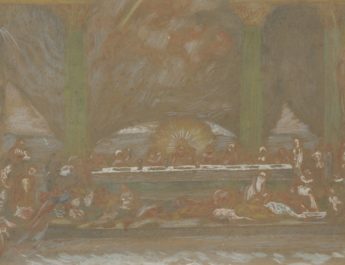Esther 7:1-6, 9-10 & 9:20-22
Ordinary B44
7:1 So the kingI and HamanII wentIII in to feastIV with QueenV Esther.VI
I “king” = melek. From malak (to be or become king or queen, to rise to the throne, to be crowned; by implication, to take counsel). This is king or royal.
II “Haman” = Haman. From Old Persian Imanis (Haman); {related to Old Persian hamayun (illustrious, magnificent)} OR from aman (to believe, endure, fulfill, confirm, support, be faithful, put one’s trust in, be steadfast. Figuratively, this is to be firm, steadfast, or faithful, trusting, believing, being permanent, morally solid) OR from hama (be noisy). This is Haman, which may mean rage, turbulent, noise, certainty, magnificent, trustworthy, unique. See https://en.wikipedia.org/wiki/Haman & https://www.abarim-publications.com/Meaning/Haman.html
III “went” = bo. This is to enter, come in, advance, fulfill, bring offerings, enter to worship, attack. It can also have a sexual connotation.
IV “feast” = shathah. This is to drink literally or figuratively. It could also be a drinker.
V “Queen” = malkah. Related to “king” in v7:1. From melek (see note I above). This is queen.
VI “Esther” = Ester. From Old Persian a-s-t-r (star) OR Akkadian ishtar (Ishtar) OR Median astra (myrtle). This is Esther or Ester, a name meaning, “star” or “myrtle.” See https://en.wiktionary.org/wiki/Esther & https://www.abarim-publications.com/Meaning/Esther.html
2 On the secondVII day,VIII as they were drinkingIX wine,X the king again said to Esther,
VII “second” = sheni. From shanah (to fold, repeat, double, alter, or disguise). This is double, again, another, second.
VIII “day” = yom. Root may mean being hot. This is the day in a literal or figurative sense. It can also mean birth, age, daylight, continually or other references to time.
IX “drinking” = mishteh. Related to “feast” in v7:1. From shathah (see note IV above). This is drink or the act of drinking. So it is a feast or banquet, as occasions with drinking.
X “wine” = yayin. Root may mean to effervesce, referring to the fermentation process. This is wine, grape, or banquet. It can imply intoxication.
“What is your petition,XI Queen Esther? It shall be grantedXII you. And what is your request?XIII Even to the halfXIV of my kingdom,XV it shall be fulfilled.”XVI
XI “petition” = sheelah. 14x in OT. From shaal (to ask, inquire, beg, borrow, desire, request; can also mean demand). This is something that is requested like a petition, request, or loan. Used frequently in the book of Esther.
XII “granted” = natan. This is to give, put, set, offer. It is to give literally or figuratively.
XIII “request” = baqqashah. 8x in OT – all in Ezra & Esther. From baqash (to seek, ask, desire, or request; any kind of searching; to worship or pray – implies a striving for). This is a request or petition.
XIV “half” = chatsi. From chatsah (to halve, divide, reach, participate). This is half, middle, midnight, midst.
XV “kingdom” = malkut. Related to “king” and “Queen” in v7:1. From the same as melek (see note I above). This is royalty, kingdom, realm, empire – the power the sovereign has.
XVI “fulfilled” = asah. This is to make, do, act, appoint, become in many senses.
3 Then Queen Esther answered,XVII “If I have wonXVIII yourXIX favor,XX O king,
XVII “answered” = anah. This is answer, respond, announce, sing, shout, or testify. It means to pay attention, which implies responding and, by extension, starting to talk. Used in a specific sense for singing, shouting, testifying, etc.
XVIII “won” = matsa. This is to find, catch or acquire. It can also mean to come forth or appear. Figuratively, this can mean to meet or be together with.
XIX “your” = ayin. Literally, “in your sight.” This is eye in a literal or figurative sense so eye, appearance, favor, or a fountain (the eye of the landscape).
XX “favor” = chen. From chanan (beseech, show favor, be gracious; properly, to bend in kindness to someone with less status). This is grace, favor, kindness, beauty, precious.
and if it pleasesXXI the king, let my lifeXXII be givenXXIII me—that is my petition—and the lives of my peopleXXIV—that is my request.
XXI “pleases” = tob. This is to be good, go well, please.
XXII “life” = nephesh. Related to naphash (to refresh or be refreshed). This is soul, self, person, emotion. It is a breathing creature. Can also refer to appetites and desires.
XXIII “given” = natan. Same as “granted” in v7:2. See note XII above.
XXIV “people” = am. From amam (to darken, hide, associate; creating shadows by huddling together). This is people or nation. It can be used specifically for a tribe, collectively of troops or armies, or figuratively to refer to a flock of animals.
4 For we have been sold,XXV I and my people, to be destroyed,XXVI to be killed,XXVII and to be annihilated.XXVIII
XXV “sold” = makar. This is to sell – could be commerce/trade, a daughter to be married, someone into slavery. Figuratively, it can mean to surrender.
XXVI “destroyed” = shamad. This is to demolish, destroy, perish, overthrow, pluck down.
XXVII “killed” = harag. This is to strike with deadly intent so it can be kill, destroy, murder, or put to death.
XXVIII “annihilated” = abad. To wander off, lose self. This implies to perish, destroy, die, vanish, or be broken or corrupt.
If we had been sold merely as slaves, menXXIX and women,XXX I would have held my peace;XXXI but no enemyXXXII can compensateXXXIII for this damageXXXIV to the king.”
XXIX “slaves, men” = ebed. From abad (to work, serve, compel; any kind of work; used causatively, can mean to enslave or keep in bondage). This is a servant, slave, or bondservant.
XXX “women” = shiphchah. Root may mean to spread out – it would be the same root used in mishpachah, which means family or clan. This is maidservant, female slave, or female bondslave.
XXXI “held my peace” = charash. This is to scratch, which implies etching or plowing. It can mean to manufacture regardless of materials used. Figuratively, it can be to devise or conceal. It can also have a sense of secrecy. Hence, being silent or left alone. It can also be speechless.
XXXII “enemy” = tsar. From tsarar (to bind, restrict, narrow, be cramped, an adversary). Properly, this is a narrow or constricted place. Figuratively, it can be trouble, a pebble, an enemy, anguish, or distress.
XXXIII “compensate” = shavah. This is to equalize, resemble, agree with, compare, adjust, compose, place, or yield.
XXXIV “damage” = nezeq. 1x in OT. From the same as nezem (a ring worn for decorative reasons; earrings, nose rings, or other jewels). This is injury, annoyance, or loss.
5 Then King AhasuerusXXXV said to Queen Esther, “Who is he, and where is he, who has presumedXXXVI to doXXXVII this?”XXXVIII
XXXV “Ahasuerus” = Achashverosh. From Old Persian xsayarsha (“ruler among kings” or “hero among kings”); {from xshaya (king) + arshan (male)}. This is Ahasuerus or Artaxerxes. It is the king’s title and not a personal name. See https://en.wiktionary.org/wiki/Ahasuerus & https://en.wikipedia.org/wiki/Ahasuerus
XXXVI “presumed” = male + leb. Literally, “filled his heart.” Male is fill, satisfy, replenish, accomplish, fulfill, confirm, or consecrate. It is fill in a literal or figurative sense. Leb may be related to labab (to encourage; properly, to be encased as with fat; used in a good sense, this means to transport someone with love; used in a bad sense, it can mean to dull one’s senses). This is the heart, courage, one’s inner self, the mind, or the will. Heart is only used in a figurative sense in the Old and New Testaments.
XXXVII “do” = asah. Same as “fulfilled” in v7:2. See note XVI above.
XXXVIII “this” = ken. Perhaps from kun (properly, in a perpendicular position; literally, to establish, fix, fasten, prepare; figuratively, it is certainty, to be firm, faithfulness, render sure or prosperous). This is to set upright. Generally used figuratively to mean thus, so, afterwards, rightly so.
6 Esther said, “AXXXIX foeXL and enemy,XLI this wickedXLII Haman!” Then Haman was terrifiedXLIII beforeXLIV the king and the queen.
XXXIX {untranslated} = ish. Perhaps from enosh (human, humankind, mortal); from anash (to be weak, sick, or frail). This is man, husband, another, or humankind.
XL “foe” = tsar. Same as “enemy” in v7:4. See note XXXII above.
XLI “enemy” = oyeb. From ayab (to hate or be hostile to). This is a foe or enemy as one that you are hostile to.
XLII “wicked” = ra’. From ra’a’ (to be evil, bad, afflict; properly, to spoil – to destroy by breaking into pieces; figuratively, to cause something to be worthless; this is bad in a physical, social, or moral sense; that which displeases, to do harm or mischief, to punish or vex). This is bad, disagreeable, that which causes pain, misery, something having little or no value, something that is ethically bad, wicked, injury, calamity. This refers to anything that is not what it ought to be – a natural disaster, a disfigurement, an injury, a sin.
XLIII “terrified” = baath. 16x in OT. This is to terrify, startle, overwhelm, terrorize, or fall upon.
XLIV “before” = paneh. From panah (to turn, face, appear). This is face in a literal or figurative sense. It could be face, presence, anger, respect. It can also be used of God to indicate divine favor or presence.
9 Then Harbona,XLV oneXLVI of the eunuchsXLVII in attendance onXLVIII the king,
XLV “Harbona” = Charbona. 2x in OT. Of Persian origin. This is Harbona, a name which may mean one who drives a donkey. See https://www.biblestudytools.com/dictionary/harbona-harbonah/
XLVI “one” = echad. Perhaps from achad (to unify, continue on a path; figuratively, to gather one’s thoughts). This is the number one, first, united. It can also be alone, altogether, a certain, a few.
XLVII “eunuchs” = saris. Root is likely foreign and may mean castrate. So, this could be a eunuch, valet, or other kind of officer.
XLVIII “in attendance on” = paneh. Same as “before” in v7:6. See note XLIV above.
said, “Look,XLIX the very gallowsL that Haman has preparedLI for Mordecai,LII whose word savedLIII the king,
XLIX “look” = hinneh. From hen (lo! Behold! If, though; an expression of surprise). This is to draw attention, show suddenness or surprise, or to emphasize the importance of the coming statement. See! Lo! Behold!
L “gallows” = ets. Perhaps from atsah (to shut, fasten, firm up, to close one’s eyes). This is tree or other things related to trees like wood, sticks, or stalks. It can also refer to wood products like a plank or staff or gallows. Additionally, this can refer to a carpenter.
LI “prepared” = asah. Same as “fulfilled” in v7:2. See note XVI above.
LII “Mordecai” = Mordekay. From Marduk (Marduk – “Bull Calf of Utu {the solar deity)”); {Sumerian Amarutu (Marduk); {from anum (god); {from an (sky, sky god)} + buru (calf) + shamshu (sun); {from ud (sun, day)}}}; {with a tongue in cheek Hebrew derivation of mar (bitterness literal or figurative) + dak (crushed so figuratively it refers to the injured or afflicted)}. This is Mordecai, a name meaning, “of Marduk” or “of bitter oppression.” See https://www.abarim-publications.com/Meaning/Mordecai.html & https://www.abarim-publications.com/Meaning/Marduk.html & https://en.wiktionary.org/wiki/Marduk
LIII “word saved” = dabar + tob. Literally, “spoke good.” Dabar is generally to speak, answer, declare, or command. It might mean to arrange and so to speak in a figurative sense as arranging words. Tob is related to “pleases” in v7:3. From tob (see note XXI above). This is good, beautiful, pleasant, agreeable, bountiful, at ease. This word is used for goodness as a concept, a good thing, a good person. This can refer to prosperity and welfare as well as joy, kindness, sweetness, and graciousness. So, this is ethically good, but also enjoyably good.
standsLIV at Haman’s house,LV fiftyLVI cubitsLVII high.”LVIII
LIV “stands” = amad. This is to stand up in a literal or figurative sense. So it can be establish, continue, endure, take a stand, act, be a servant, stand still, remain, stand against an enemy.
LV “house” = bayit. Probably from banah (to build, make, set up, obtain children; to build literally or figuratively). This is house, court, family, palace, temple.
LVI “fifty” = chamishshim. From chamesh (five, fifth). This is fifty.
LVII “cubits” = ammah. From the same as em (mother). This is a cubit, post, threshold, pivot. It is mother as the basic measure (the length of the forearm). It is also mother as the which bonds an entryway i.e. the base of the door.
LVIII “high” = gaboah. From gabah (to be tall, high, exalted, proud, haughty). This is high, tall, long, proud, or arrogant. It could also be a high ranking official, someone exalted, or something lofty.
And the king said, “HangLIX him on that.” 10 So they hanged Haman on the gallows that he had preparedLX for Mordecai. Then the angerLXI of the king abated.LXII
LIX “hang” = talah. This is to hang or suspend. It can also be used for hanging someone on gallows.
LX “prepared” = kun. Related to “this” in v7:5. See note XXXVII above.
LXI “anger” = chemah. From yacham (to be hot, mate; figuratively, to conceive). This is heat – figuratively it can be anger or fury. It can also refer to poison or venom as they can cause fever.
LXII “abated” = shakak. 5x in OT. This is to decrease, subside, pacify. It can also mean to weave as when one sets a trap. It is also used when the Great Flood subsides in Genesis 8.
9:20 Mordecai recordedLXIII these things,LXIV and sentLXV lettersLXVI to all the JewsLXVII
LXIII “recorded” = kathab. This is to inscribe, write, record, or decree.
LXIV “things” = dabar. Related to “word saved” in v7:9. From dabar (see note LIII above). This is speech, a word, a matter, an affair, charge, command, message, promise, purpose, report, request. It is a word, which implies things that are spoken of in a wide sense.
LXV “sent” = shalach. This is to send out, away, send for, forsake. It can also mean to divorce or set a slave free.
LXVI “letters” = sepher. Perhaps from saphar (to tally or record something; to enumerate, recount, number, celebrate, or declare). This is can be writing itself or something that is written like a document, book, letter, evidence, bill, scroll, or register.
LXVII “Jews” = Yehudi. From Yehudah (Judah, son of Jacob, his tribal descendants, a name for the southern kingdom. Literally, it means praised); probably from yadah (to throw one’s hands into the air in a gesture of praise); from yad (hand). This is Jew or Jewish – one descended from Judah.
who were in all the provincesLXVIII of King Ahasuerus, both nearLXIX and far,LXX 21 enjoiningLXXI them that they shouldLXXII keepLXXIII
LXVIII “provinces” = medinah. From din (to judge, defend, dispute, govern, strive). This is an area or province overseen by a judge So, it’s a jurisdiction, region, or province.
LXIX “near” = qarob. From qarab (to come near, offer, make ready). This is near whether nearby, related, near in time, or allied.
LXX “far” = rachoq. From rachaq (to widen, become distant, cast, or remove in a literal or figurative sense). This is distant or far, whether of space or of time.
LXXI “enjoining” = qum. To arise, stand, accomplish, establish, abide. This is rising as in rising against, getting up after being sick or asleep, arising from one state to another, becoming powerful, or rising for action. It can also be standing in a figurative sense.
LXXII “should” = hayah. This is to be or become, to happen.
LXXIII “keep” = asah. Same as “fulfilled” in v7:2. See note XVI above.
the fourteenthLXXIV day of the monthLXXV AdarLXXVI and also the fifteenthLXXVII day of the same month, year by year,LXXVIII
LXXIV “fourteenth” = arba + asar. Arba is from raba (to make square or be four-sided). This is four. Asar is from the same as eser (ten). It is ten or -teen.
LXXV “month” = chodesh. From chadash (to renew, repair). This refers to a new moon. It can also mean monthly.
LXXVI “Adar” = Adar. 8x in OT – all in Esther. Perhaps from Akkadian addari (month of grain or barley; around February or March). This is the 12th month Adar. See https://en.wiktionary.org/wiki/%D7%90%D7%93%D7%A8#Hebrew
LXXVII “fifteenth” = chamesh + asar. Chamesh is related to “fifty” in v7:9. See note LVI above. Asar is related to “fourteenth” in v9:21. See note LXXIV above.
LXXVIII “year by year” = kol + shanah + shanah. Literally, “every year and year.” Shanah is from shana (to change, alter). This is a year, age, old. It can also mean yearly.
22 as the days on which the Jews gained reliefLXXIX from their enemies,LXXX and as the month that had been turnedLXXXI for them from sorrowLXXXII into gladness LXXXIII
LXXIX “gained relief” = nuach. This is to rest, calm, camp, free, place, remain, satisfy, settle, station, or wait. It is rest and so implies settling down in a literal or figurative sense. This is perhaps the root verb of the name “Noah.”
LXXX “enemies” = oyeb. Same as “enemy” in v7:6. See note XLI above.
LXXXI “turned” = haphak. This is to turn, overturn, change, return, turn over, pervert.
LXXXII “sorrow” = yagon. 14x in OT. From yagah (to suffer, grieve, afflict). This is grief or sorrow.
LXXXIII “gladness” = simchah. From samach (to rejoice, be glad; properly, to brighten up; also used figuratively). This is joy, rejoicing, pleasure, or glee.
and from mourningLXXXIV into a holiday;LXXXV that they should makeLXXXVI them days of feastingLXXXVII and gladness,
LXXXIV “mourning” = ebel. From abal (to mourn, bewail). This is mourning or lamentation.
LXXXV “holiday” = yom + tob. Literally, “good day.” Yom is the same as “day” in v7:2. See note VIII above. Tob is the same as “word saved” in v7:9. See note LIIII above.
LXXXVI “make” = asah. Same as “fulfilled” in v7:2. See note XVI above.
LXXXVII “feasting” = mishteh. Same as “drinking” in v7:2. See note IX above.
days for sendingLXXXVIII giftsLXXXIX of food to one anotherXC and presentsXCI to the poor.XCII
LXXXVIII “sending” = mishloach. Related to “sent” in v9:20. 10x in OT. From shalach (see note LXV above). This is a sending forth, presentation, seizure, dismissal.
LXXXIX “gifts” = manah. 14x in OT. From manah (to weigh out, reckon, count, number, set, tell. By implication, it is allotting or providing something officially). This is a part or portion. It is something that is weighed out so it can be used specifically for a ration or portion of food. It can also mean a lot as in casting lots.
XC “to one another” = ish + rea. Literally, “a man to his neighbor.” Ish is the same as {untranslated} in v7:6. See note XXXIX above. Rea is from raah (to associate with). This is the same as neighbor in Leviticus 19:18 “love your neighbor as yourself.” This is friend, companion, fellow, neighbor. It is someone with whom you associate, whether more or less close.
XCI “presents” = mattanah. Related to “granted” in v7:2. 17x in OT. From mattan (gift, reward, to give); from natan (see note XII above). This is gift, offering of sacrifice, present, bribe.
XCII “poor” = ebyon. From abah (to consent, obey, want, yield, accept). This is needy, poor, beggar. Someone who is wanting.
Image credit: “Esther Denouncing Haman” by Ernest Normand, 1888.




